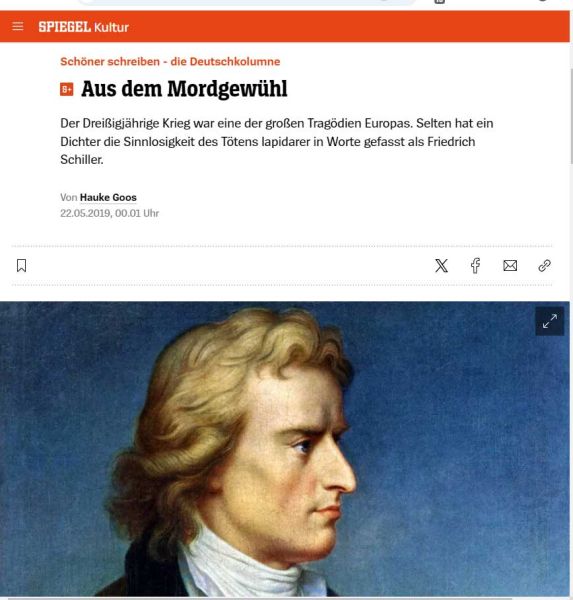Friedrich Schiller
Friedrich Schiller
My old German teacher Hermine Kahl suggested that I listen to a recording of German poems, as the means to adopt a spirited intonation of German words. She played the recording for me in her home. When a poem particularly touched her, I could hear her chortle with a grimacing smile, that signalled a personal connection to it, as if savoring it.
I bought my own copy of the recording and played it so often, I eventually memorized some of the poems. The poems by Friedrich Schiller interested me the most. One of the poems, titled "An die Freunde" (To Friendship) ends with a few inspiring lines. "Ewig jung ist nur die Fantasie. Was sich nie und nirgends hat begeben. Das allein veraltet nie!" It loosely translates "The only human assets that never grow old are your imagination and the part of you that never surrenders."
Not only was Schiller a poet and dramatist, he also wrote meaningful histories of events like the 30-Years War
But further interest in Schiller remained on the back-burner for many years afterward, until I heard Beethoven's 9th Symphony performed in the East Berlin Konzerthaus, Christmas Night, 1989, after the Berlin Wall had fallen. East and West Germany began the long journey to reunification, and the leading luminaries in Berlin thought that 9th gave it the right orientation.
Leonard Bernstein came over from America to direct the Berlin Philharmonic and to lead a choir in the choral fourth movement. In addition to a choir, he needed soloists for the demanding solo parts. Americans know that choral movement as "Ode to Joy". Most of them do not know that Friedrich Schiller composed the original poetry for it. He titled it "An die Freude". Beethoven composed the music for it while totally deaf. In spite of this disability, he created possibly the finest work in the Western canon of music.
Since then, if I hear a few lines of Schiller's poetry in my brain, I will do another Google-search for Schiller on the computer—without even thinking about it. From his poetry, I drifted to his dramatic works. This post concerns The Fiesco Conspiracy, which Schiller published in 1783 (German title: Die Verschwörung des Fiesco zu Genua), his second play.
Schiller wrote as a republican, as a challenge to monarchical and aristocratic power, because of his wish for a constitution and representative government. Those wishes made him a rebel in the eyes of the powers-that-be. For that reason he had to flee his home and go on the run from one province in Germany to another.
Fiesco tells the story of a young nobleman in Genoa, Italy, Giovanni Luigi de Fieschi, who leads a conspiracy to depose Andrea Doria, the "Doge" or chief administrator of the city. Schiller writes as a sort of cynic of his own politics. Verrina, a life-long republican, mistrusts the other conspirators, including Fieschi himself! The other conspirators have mostly self-serving reasons for participating in the conspiracy. Verrina suspects that Fieschi cannot make up his mind if he wants to lead Genoa as a republic, or if he wants to assume Andrea Doria's own job and rule as Doge. His co-conspirators worry when they see him take off his own black cloak and put on Doria's scarlett cloak—scarlett being the color of the ruling nobility.
Critics describe the dramatic cross-currents of Schiller's plays as "complex". They try to understand his intentions as a "cosmopolitan thinker", as a "liberal", or lover of human liberty, and none of the descriptions gives anyone a sense of resolution; but when I think about Fiesco, and his other plays like The Robbers, William Tell, or Don Carlos, all of which deal with men in leadership positions, I see Schiller trying to convey to readers a timeless duel, pitting the limits of human associations against the demands of the individual conscience.



